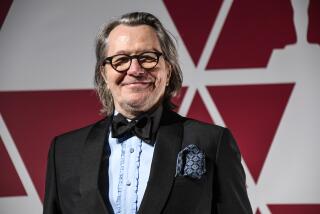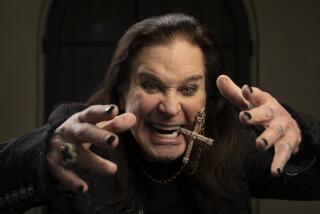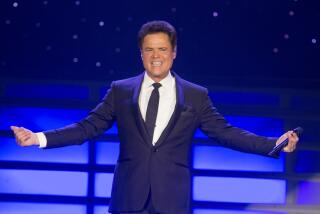Donny Osmond Works to Reclaim a Place at Top . . . : Former Teeny-Bopper Idol Believes Time Forgives
Though it has been years since Donny Osmond has released a record album, let alone a Top 40 single, he still can’t order furniture for his home in Irvine without using a fake name.
“As soon as I give my real name,” he explained in a recent interview, “the price goes up.”
The former teeny-bopper idol takes little pleasure from the fame that precedes him in the furniture business. But what really nags is the reputation that trails him around in the music business.
“My old image is starting to die,” Osmond said, making it clear with a hopeful smile that he would be grateful for large miracles. “Time forgives everything.”
But since time seems to be in even less of a hurry than the unforgiving rock critics who used to put him down with monotonous regularity, he hopes to quicken the pace with a new, five-piece band and live gigs Monday and Tuesday nights at the Crazy Horse Steak House in Santa Ana.
To borrow a phrase from the auto ads, the band comes “fully loaded.” The players are equipped with high-tech equipment from synthesizers to sequencers to sound samplers, as well as the usual bass, drums, keys, percussion and guitar.
“We’re going to get it together down here in Orange County,” said Osmond, who will be doing the singing plus some computerized keyboard playing. “After that we go out and kick butt.”
He was reminded that he made similar claims 15 months ago, predicting that a newly recorded album would reshape his career and “blow a lot of people away.” The album “just didn’t turn out quite right,” Osmond concedes. Instead of being released last spring by Epic Records as originally planned, he said, it will come out this summer on the Virgin Records label.
Osmond, boyishly handsome at 30, speaks with candor of his fall from grace as a show-biz prodigy who rode a crest of popularity to the top of the charts and then crossed over to television glory. While it lasted, his bubble-gum circus of musical tricks was almost as critic-proof as Liberace’s and, at its peak on the tube, probably as bankable.
The Osmond clan--Donny, sister Marie and their four older brothers--recorded a couple of dozen gold singles and albums. And from 1976 to 1979, tens of millions of television viewers tuned in weekly to “The Donny and Marie Show” on ABC, a glib and glitzy hour of prime-time programming that invariably identified Marie as “a little bit country” and Donny as “a little bit rock ‘n’ roll.”
“The show went off and I went bam--nobody wanted me,” Osmond recounted. “I took a lot of raps. It was a bad period. The problem is, the higher you rise and the more popular you are, the bigger the backlash you get. Look at what happened to Michael (Jackson). But I’m patient now. Perseverance is important for me, particularly in my situation.”
As far as his family life goes, that situation couldn’t be better, he said. Relaxing in a denim jacket and jeans, Osmond said that living with his wife, Debbie, and their three children in the Woodbridge section of Irvine is “wonderfully normal.”
Moreover, Osmond added, his widely publicized estrangement from his brothers and sister was exaggerated by reporters, and despite “things I probably shouldn’t have said in the press . . . Marie and I remain relatively close. She came down and stayed with us last week.”
But professionally, Osmond’s situation leaves a great deal to be desired--not only as an artist but also as chairman of the Donny Osmond Entertainment Corp., a publicly traded company formed in 1984 to produce and distribute a variety of entertainment programming.
When the Santa Ana-based company was capitalized three years ago, according to the 1987 annual report, shares were worth $5 each and the company had assets of $3.3 million. As of last June, the company had yet to turn a profit; its shares were valued at a penny each, and company assets came to $253,472.
Osmond has taken a bath himself. His 100,000 shares, representing an investment of $500,000, are now worth $1,000.
The company’s key project--syndicating the old “Donny and Marie Show”--encountered an unforeseeable problem. After distribution rights were purchased from ABC for $1.1 million and an additional $500,000 was spent in development costs, Osmond said, the company discovered that paying for residual rights to all the songs performed during the show’s 81 hours would make syndicated reruns prohibitively expensive.
“There wouldn’t be anything left, and the whole company is really based on those shows,” said Osmond, fingering a diamond-studded wedding band (the only jewelry he wears). “So we’re negotiating with the unions to pay a lower rate. I still think we have a market for kids with a ‘best of’ (anthology). And maybe it won’t destroy my image all over again once my new material comes out.”
In the meantime, Osmond has turned into more of a suburban pop-and-roller than ever--spending most of his time at home now writing his own songs.
Unable to read music, though he has performed since age 5, Osmond said he relies exclusively on his ear to come up with the “grooves” and “hooks” of his melodies. He records them on tape, using his computerized keyboard and then brings the tape to other musicians for further elaboration.
“The dangerous thing is to let the computer write the music,” he noted. “Just listen to what’s on the radio. The music is ‘sequenced’ to death. Disco is back, and it’s pretty boring. It’s all bland.”
Osmond said his collaborators tell him he doesn’t need to read music because the latest electronic instruments allow a player to recreate every imaginable sound at the press of a button. But he regrets not being able to decipher a score.
In fact, none of the Osmonds ever read music, except at the most rudimentary level. He and Marie and their brothers had to learn sophisticated vocal harmonies week after week at the height of their television success, Osmond recalled, by having the arrangements played on a piano for them a note at a time.
“One of my brothers would plunk it out for us,” Osmond said. “Just remembering how hard we worked at that makes me sick. People tell me, ‘Don’t worry about music theory. We’ve been through it and we don’t use it.’ But what they don’t realize is they’re depending on it. They’re using it without thinking about it.”
Even so, Osmond’s decades of experience as an instinctive performer have made him savvy enough to realize that the best songs don’t always become hits, and the hits aren’t always the best songs.
“This business is very political,” he acknowledged. “It’s all in who you know. If you get to the right people with a tune, it’s going to be a hit. A bad song can sound good with great production. It may hit the charts and stay out there three or four weeks. But when you hear it again you wonder why it was a hit. A good song sounds good forever.”
Osmond’s face clouded over. He didn’t want to sound cynical, he said, but there it was.
As to his own music, he argued that he wasn’t about to delude himself or the public with any talk about hardening his rock image, as he once was inclined to do. He would let “the new music” speak for itself.
“I don’t sing like (David Lee) Roth or (Bruce) Springsteen,” he said, “and I’ll never profess to.”
DONNY OSMOND
Monday and Tuesday nights, 7 and 10 p.m.
Crazy Horse Steak House, 1580 Brookhollow, Santa Ana.
Tickets: $24.
Information: (714) 549-1512.
More to Read
The biggest entertainment stories
Get our big stories about Hollywood, film, television, music, arts, culture and more right in your inbox as soon as they publish.
You may occasionally receive promotional content from the Los Angeles Times.










